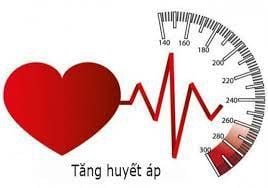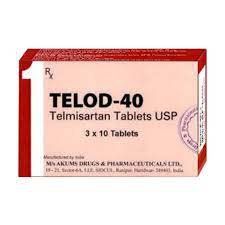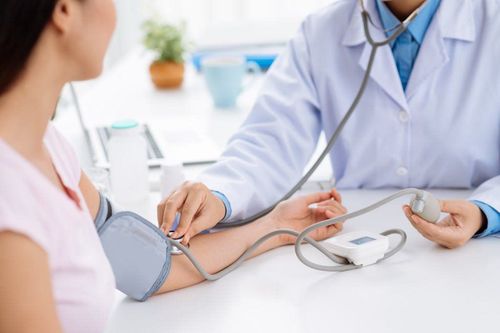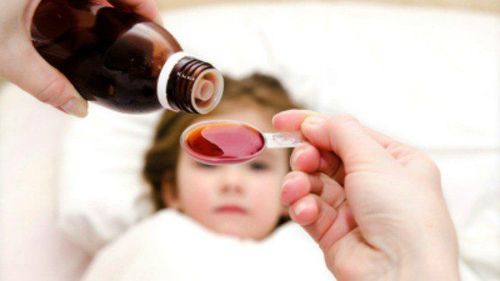This is an automatically translated article.
The article was professionally consulted by Specialist Doctor II Le Thanh Cam - Department of Pediatrics - Neonatology, Vinmec Da Nang International General Hospital.If the doctor determines the child's blood pressure is high, the parent will need to bring the child back for a few more tests and may ask your child to wear a portable device called a 24-hour sphygmomanometer. . If the blood pressure results are still this high, the child will be diagnosed with childhood hypertension.
1. What is hypertension in children?
Blood pressure is the pressure of blood flowing through the vessels of the body. Under normal conditions, the heart pumps blood through all the vessels throughout the body. However, in people with high blood pressure, it becomes harder to push blood, which can cause damage to blood vessels, the heart, and other organs.Hypertension in adults when blood pressure ≥ 140/90 mmHg regardless of age, sex, body size. This is a functional definition based on the association of blood pressure numbers with cardiovascular events.
Because cardiovascular events caused by hypertension such as myocardial infarction and stroke are less common in childhood, the definition of hypertension in children is more statistical than functional.
NHBPEP has released the 4th report (2004) updating the definition, diagnosis and treatment of hypertension in children and the table of pediatric blood pressure values by age and sex with 50th, 90th percentiles. , 95th , 99th values of systolic and diastolic hypertension.
Normal – high blood pressure (considered prehypertension): Mean systolic and/or mean diastolic blood pressure ≥ 90th but < 95th percentile; ≥ 120/80 mmHg and < 95th percentile in older children and adolescents.
Hypertension: mean systolic and/or mean diastolic blood pressure ≥ 95th percentile for age, sex, height on at least 3 different measurements.
White coat hypertension: Blood pressure value ≥ 95th percentile in hospital/clinic but <90th percentile outside hospital.
2. Diagnostic criteria for hypertension in children
Unlike in adults, blood pressure measurement in children does not have a specific definition of a normal blood pressure level based only on systolic blood pressure readings above diastolic blood pressure, which is measured by blood pressure readings. considered normal depends on the age, sex and height of the child.Therefore, specialists recommend that all children have their blood pressure measured every year from the age of 3. If the doctor determines the child's blood pressure is high, the parent will need to bring the child back for a few more tests and your child will need to wear a portable device called a 24-hour sphygmomanometer. If the blood pressure results are still this high, the child will be diagnosed with childhood hypertension.
After being diagnosed with a child with high blood pressure, parents need complete information about the child's health history including diet, activities at home, at school, level of physical activity and other stressors in children.
Your doctor will also conduct additional tests such as urinalysis, blood tests and kidney ultrasound to help determine the cause of your child's hypertension.
3. Causes of high blood pressure in children

Causes of childhood hypertension are divided into primary and secondary hypertension.
Primary hypertension
It occurs on its own, with no identifiable cause. This type of blood pressure occurs more often in older children, usually 6 years of age or older. Risk factors for developing primary hypertension include:
Being overweight or obese Having a family history of high blood pressure Having high cholesterol Eating too much salt Having type 2 diabetes or high fasting blood sugar Gender Gender male Smoking or exposure to second-hand smoke Being sedentary Secondary hypertension
Renal - urinary causes: such as Chronic pyelonephritis; Chronic glomerulonephritis; Congenital renal dysplasia; Polycystic kidney; Single cyst kidney; Reflux nephropathy; Kidney tumor; Kidney injury; Kidney damage due to transplant rejection; Kidney damage after radiation therapy; Kidney damage due to systemic disease; Ureteral obstruction. Neurological causes: such as Increased intracranial pressure; Guillain-Barre syndrome; Burn; Familial autonomic disorder; Posterior fossa injury; Injury to the spinal cord; Myelitis. Drug-induced causes: Using drugs containing cocaine; sympathomimetic drugs; Amphetamine; Sirolimus; Licorice; Hormones; Cyclosporin. Cardiovascular causes: Children with coarctation of the aorta; Renal vascular disease; Renal vein occlusion; Vasculitis; Dynamic – venous shunt; Williams-Beuren syndrome; Takayasu's disease; Moyamoya disease and some other congenital heart diseases cause high blood pressure. Other causes: Hypercalcemia; After surgery to correct aortic coarctation; Transfusion of white blood cells; After the procedure, extracorporeal membrane oxygenation (ECMO); Chronic upper airway obstruction. Sleep disturbances, especially sleep apnea.
4. Symptoms of high blood pressure in children
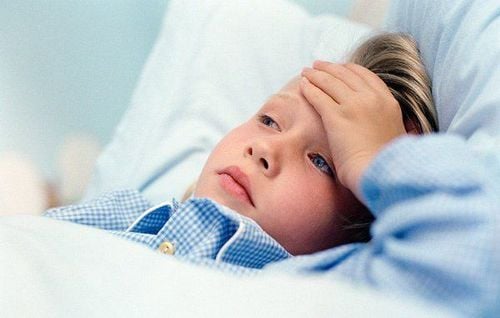
Like adults, hypertension in children is also a silent killer disease, because it rarely shows obvious symptoms, complications come unexpectedly and dangerous. If children have long-term high blood pressure without early detection and treatment, it will cause many serious consequences with complications such as heart failure, kidney failure, cerebrovascular accident or brain disease.
This is a very dangerous disease but few parents pay attention. Therefore, to make an accurate diagnosis, experts recommend that children 3 years of age and older have their blood pressure measured during physical exams. Early detection of the disease will make it easier for doctors to treat and prevent serious complications over time. Take your child to the doctor and have their blood pressure measured on time, especially if your child is obese or has a family history of high blood pressure.
As a key area of Vinmec Health system, Pediatrics Department always brings satisfaction to customers and is highly appreciated by industry experts with:
Gathering a team of top doctors and nurses in Pediatrics : consists of leading experts with high professional qualifications (professors, associate professors, doctorates, masters), experienced, worked at major hospitals such as Bach Mai, 108.. Doctors All doctors are well-trained, professional, conscientious, knowledgeable about young psychology. In addition to domestic pediatric specialists, the Department of Pediatrics also has the participation of foreign experts (Japan, Singapore, Australia, USA) who are always pioneers in applying the latest and most effective treatment regimens. . Comprehensive services: In the field of Pediatrics, Vinmec provides a series of continuous medical examination and treatment services from Newborn to Pediatric and Vaccine,... according to international standards to help parents take care of their baby's health from birth to childhood. from birth to adulthood Specialized techniques: Vinmec has successfully deployed many specialized techniques to make the treatment of difficult diseases in Pediatrics more effective: neurosurgery - skull surgery, stem cell transplantation. blood in cancer treatment. Professional care: In addition to understanding children's psychology, Vinmec also pays special attention to the children's play space, helping them to have fun and get used to the hospital's environment, cooperate in treatment, improve the efficiency of medical treatment.
Please dial HOTLINE for more information or register for an appointment HERE. Download MyVinmec app to make appointments faster and to manage your bookings easily.







